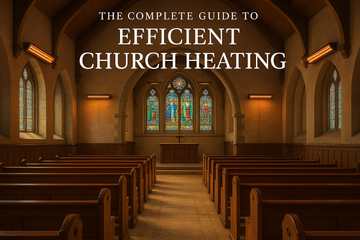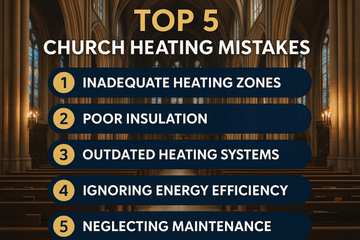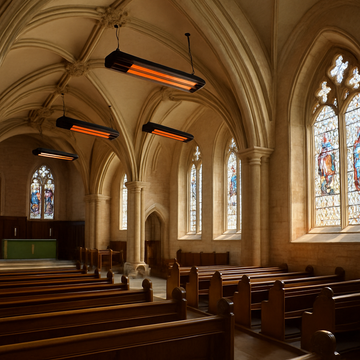
How to Heat a Church Efficiently Without Damaging the Building
Heating a church is not just about comfort. It's about doing it in a way that respects the building's heritage, maintains its unique character, and avoids the structural and aesthetic damage traditional systems can cause. Whether you're responsible for a centuries-old cathedral or a small community chapel, finding the right solution requires careful planning.
The Challenges of Heating Churches
Churches are notoriously hard to heat. Most are:
-
Large, open spaces with high ceilings
-
Poorly insulated or completely uninsulated
-
Built from stone or brick, which absorbs and dissipates heat
-
Used intermittently (e.g. Sundays or events)
Traditional convection systems, like gas radiators or fan heaters, struggle in this environment. Warm air rises, escaping into the upper void. And the time it takes to bring a space to temperature can be hours - with huge energy costs.
Why Traditional Heating Methods Fall Short
-
Condensation and Damp: Convection systems heat air, which raises humidity and encourages condensation - especially on cold stone surfaces. This can damage both the building and its contents.
-
Aesthetic Impact: Installing pipes, radiators, or large HVAC units often clashes with the church's historical character.
-
Inefficiency: Warming air in a huge vertical space wastes energy. You end up paying to heat the ceiling.
The Infrared Advantage
Infrared heating flips the script. Rather than heating air, it heats people and surfaces directly. Think of it like the warmth of the sun - you feel it even on a cold day.
This makes it ideal for churches, where you want targeted, immediate warmth without trying to heat the entire volume of space.
Key Benefits:
-
Zero condensation risk
-
Fast response (warmth in minutes)
-
Silent operation
-
100% maintenance-free
-
No moving parts
-
No visible pipework or disruption to historic interiors
See our recommended Infrared heating solutions for Churches
Protecting Heritage Structures
Stone, woodwork, paintings, and textiles in older churches can all be negatively affected by fluctuating humidity and temperature. Infrared heating keeps these stable by reducing moisture in the air and avoiding excessive thermal cycling.
Churches that have switched to infrared often see improvements in:
-
Organ and wood preservation
-
Mould and damp reduction
-
Energy bills
-
Occupant comfort
Zoning and Scheduling
Because infrared works instantly and doesn’t rely on preheating, it allows for intelligent zoning. Only heat the pews. Or the altar area. Or a single chapel for private use.
Combine this with smart thermostats or WiFi controls, and you get even more efficiency.
Real Feedback from Churches
"We needed a solution that wouldn’t ruin the look of our church, but still kept people warm. These heaters have done just that. They’re silent, efficient, and surprisingly stylish. The congregation noticed the difference instantly."
Choosing the Right Heater
Infrared heaters come in various sizes and outputs. For churches, bar heaters or suspended heritage panels are ideal.
We recommend:
These are purpose-built for large heritage interiors, with WiFi and remote control functionality.
How Much Power Do I Need?
Use our Wattage Calculator to match heater size to your space. Just input the dimensions, usage frequency, and insulation level.
Summary
Heating a church doesn’t have to mean compromising its character or blowing the annual budget on energy bills. Infrared offers a modern, safe, and respectful alternative - one that aligns with both heritage conservation and environmental responsibility.
If you’re ready to make the switch:
-
Contact our expert team for tailored advice
Next steps: choose the right infrared heating
Continue with one of these popular options:
- Shop All Panels, accessories & bundles.
- Wattage Calculator Get the right watts for your room.
- How Infrared Works Benefits, costs & installation.






